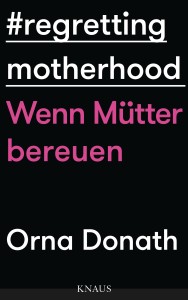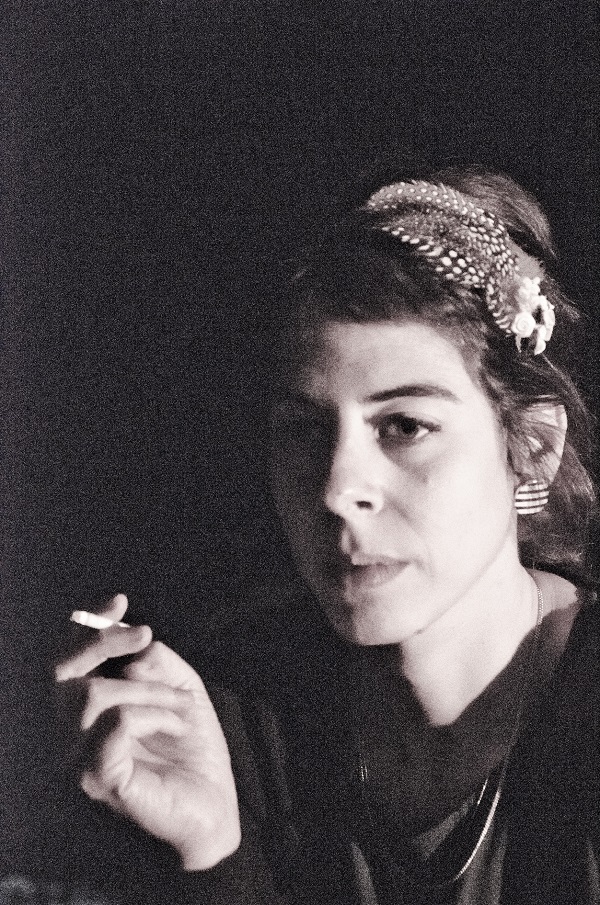Sociologist and author Orna Donath is making waves in Europe with her new book, Regretting Motherhood. I have interviewed her here before about her research on motherhood and regret in Israel. She has now published a book on this topic. Check out the Q&A on her book and how it has been received in Europe:
When Regretting Motherhood became available in Europe, what kinds of media has it received?
The first interview about my study on regretting motherhood was published in April 2015. From that moment on, I have been interviewed by newspapers in Germany, Switzerland, Sweden, Estonia, Austria, Finland and Italy, and by television and radio stations in Germany. Beside these interviews with me, a hashtag named #regrettingmotherhood was created following the first interview and unknown numbers of debates took place in social networks such as twitter and facebook and posts were written on private blogs.
What has been most challenging about how the media has talked about it?
The stormy debates were flooded with condemnations of mothers who regret next to a vast amount of testimonies of relief brought forward by mothers who themselves regretted motherhood. In addition, an unknown number of women and mothers reinforced the significance of airing – by means of regret – their distresses related to being obligated to become mothers or as the main nurturers of their children.
But the main challenge from my point of view was that the debate about regretting motherhood has shifted very quickly to a debate about maternal ambivalence while sometimes leaving behind the starting point – that is, regret.
And they are not the same: While an experience of regret may involve ambivalent feelings about motherhood, ambivalence towards motherhood does not necessarily imply regret for it. There are mothers who experience ambivalent feelings but do not regret becoming mothers, and there are mothers who regret becoming mothers and are not ambivalent about motherhood. In other words, regret does not deal with the question, “How can I come at ease with motherhood?” but with the experience that Becoming a mother was a mistake.
 My insistence that regretting motherhood should not be left behind once again and it should stay as the centre of the debate stems from understanding that conflating ambivalence and regret, treating them as though they were one and the same, obviates the possibility of listening to what mothers who lament having given birth have to say.
My insistence that regretting motherhood should not be left behind once again and it should stay as the centre of the debate stems from understanding that conflating ambivalence and regret, treating them as though they were one and the same, obviates the possibility of listening to what mothers who lament having given birth have to say.
If we rush into talking about the hardships of motherhood only, then we empty regret of any content and neutralize any ability to examine the axiom that motherhood is necessarily experienced as worthwhile by all mothers everywhere – an assumption regret sheds light on. Moreover, this conflation continues to preserve the status quo, as by using the language of complexity and ambivalence we turn our backs and walk away, again, from dealing with one of the main questions that arises from the very heart of regret: the question of the transition to motherhood itself, and the limited room women have as subjects that must consider and determine on their own whether they want to birth and raise children or not.
Another challenge has been dealing with the idea that by definition, women are irresponsible and harming due to their regret. Only in a binary social perspective can one not imagine the possibility that they regret and feel accountable for their state and responsible for their children at the same time, and that they can regret motherhood and love their children simultaneously. One doesn’t need to regret motherhood “in order” to harm or neglect children. This is not to say that the picture is ideal, but it’s human. They are humans. We are humans. And regret is one of the human emotional stances we face following decisions that we’ve made or within relationships that we have. We try to cope alongside regret many times.
The final challenge I will relate to here is the one of misreading (not to say distorting) my intentions:
My study is not a call for mothers to feel regret when they don’t, in some kind of a “trend”, nor to glorify it as if all mothers should regret now. I wanted to listen to an unspoken emotional stance towards motherhood that does exist and to let mothers who regret know that they are not alone. In addition, by suggesting a sociological and feminist analysis of lamenting ‘the road not taken’ I wanted, inter alia, to learn from another angle how deeply society is invested in obstructing roads from being taken by women, such as non-motherhood, and how deeply society is invested in forbidding emotions from being felt and spoken.
What has been the best thing about it?
Beside the texts and comments that were written in public, during the year that has passed since the first interview was published I have received e-mails from teenagers and women who do not want to be mothers and from women who regret motherhood, from different countries and from Germany in particular – and all of them wanting to say that the study has given them a voice, a place.
I could not have asked for more than that; this was my initial and foremost intention. It may be redundant to say it by I will say it anyway:
I’m not against childbirths and motherhood, I am pro-women and their right to be the owners of their bodies, thoughts, emotions, (un)capabilities, desires and dreams. They are the only ones who have the right to rule whether motherhood is or was worthwhile for them. In this sense I am totally pro childbirths and motherhood (and who am I to be pro or against anyway) – when women themselves yearn to be mothers and love being mothers in retrospective gaze, even if they deal with various conflicts and difficulties.
******
Thank you, Orna, for your brave and important work.
Dr. Orna Donath is a sociologist and a post-doctoral fellow at Ben-Gurion University of the Negev in Beer-sheva, Israel. She is the author of Making a Choice. Being Childfree in Israel (2011), which is about Israeli-Jewish women who do not want to be mothers. In February 2016, her book – Regretting Motherhood was published in Germany (Knaus/Random House) and in German. She is currently on a book tour in Germany.
You can read about the academic articles (in English) she wrote about it before its publication here. In addition to her academic research, she has served as the Chairwoman of the governing board of Hasharon’s Rape Crisis Center in Raanana, Israel, and she has been volunteering in the Center for more than a decade.


I am a Brazilian mother who regrets having had my two children just because, after having had them, I found out I wasn’t born to be a mother. Thus, raising my kids and dealing with their issues now that they are adults demands too much of my energy. I Iove them, but…
Marise, Thank you for sharing this. Like Orna, this needs more open discussion as part of dismantling pronatalism, which causes many people to have children, when really it is not the best decision for them…
I’m Mexican, Living in Scandinavia, I must say that I’m a new mother, before I had my little one I had so many thoughts about not having it.. I’m married and my husband and family (mine and his) putted a lot of pressure over me to get pregnant. It took me awhile before I felt ready to have one. My whole pregnancy was very easy, I felt “happy ” and comfortable with the idea the whole process of “motherhood” although the delivery was totally awful, the pain, the time, I was alone with my husband since my family lives back in Mexico I felt lonely, dealing with this horrible painful experience. Anyway, she is two years old and she is amazing I love her..but If I could go back in time.. you know. This summer I got the shocking news that I’m pregnant again (I swear not to have more babies anymore) and even I took all the possible preventions, it just happened. I feel very devastated and angry…sometimes this feeling feels wrong, but there’s nothing to do to change it.
Thanks so much for writing and with such candor. I feel for you and your situation. Your story of pressure and resulting feelings now that you are raising one and will be raising another is one people need to know about. The pressures people get from family can be intense, and culture adds to it. It is one of the many prices society pays for pronatalism’s influence – women having children when left to their own choice and devices, would not have…If you would like a complimentary copy of The Baby Matrix, I am happy to send it to you… L